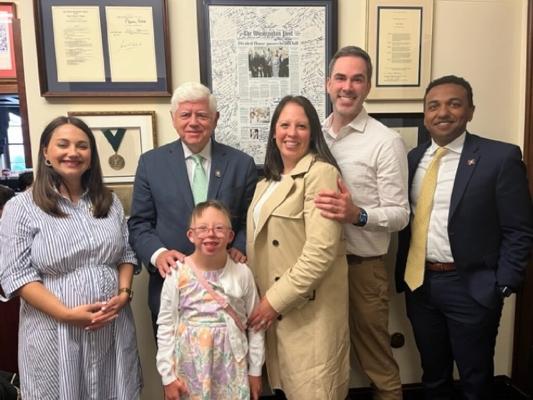Legislative Advocacy for Children
Connecticut Children’s is often called upon by policy makers to act as an expert resource on health care issues that affect children. Too often, kids do not have a voice in the decisions that affect them and their families. Connecticut Children’s advocacy efforts are aimed at ensuring that children’s concerns are always heard when public policies are made.
Public Policy Priorities
Connecticut Children’s 2025 Child Health Policy Priorities were developed to provide policymakers with a roadmap to pursue regulatory and legislative changes to help strengthen and empower families as well as protect and enhance the physical and emotional well-being of all children.
All children should have equitable access to the right care, at the right time, in the right setting. Improving access to care for children and their families cannot be accomplished without improving Medicaid rates and reforming current payment models for pediatric providers
- Medicaid payment reform: Any efforts to improve Medicaid must address Medicaid underpayment and consider the uniqueness of pediatrics. It is also essential that as policymakers consider the results of the Medicaid Rate Study, they assess the adequacy of pediatric payment rates separately from consideration of other rates, with the goal to implement long-term Medicaid rate solutions for Connecticut Children’s that achieve parity in cost coverage with adult health systems.
- Care Close to Home: Keep children healthy in their communities by helping families access care that is convenient and close to home. Strategies include supporting reimbursement for care coordination, expanding local access to critical service lines such as gene therapy and fetal care and through innovations and technologies like virtual care.
- Children With Medical Complexity: Support the needs of children with complex medical conditions, through the provision of more integrated and coordinated care, support for diagnostic tools including newborn screening and rapid whole genome sequencing and increased access to comprehensive pediatric home care.
- Pediatric Workforce: Strengthen the pediatric workforce pipeline to ensure that all children have access to pediatric experts by incentivizing people to pursue careers in healthcare, providing greater support for clinical placements, expediting licensure in certain high-demand fields, promoting greater diversity in the healthcare workforce, and at the federal level, supporting the Children’s Hospitals Graduate Medical Education (CHGME) program by pursuing parity with Medicare GME payments.
Advance innovative policies and practices that support early intervention and a comprehensive and integrative behavioral health system so that kids and families can access services where and when they need them.
- Sustainable Behavioral Health Funding: Part One of the state’s recent Medicaid rate study found that Medicaid reimbursement rates for behavioral health services were significantly less than rates in other comparable states. A sustainable model of reimbursement that covers the actual costs of providing care will ensure better access to behavioral health services for children and families by allowing providers to hire additional clinicians and supporting primary care practices to hire and effectively utilize embedded behavioral health professionals.
- Payment Parity: Promote and enforce payment parity to ensure comparability of benefits for behavioral health and medical services, cut down on administrative hurdles which are uniquely burdensome for behavioral health providers, and reduce out of pocket costs which limit access to behavioral health services.
- Focus on Children with Special Needs: Support the needs of children with intellectual disabilities by promoting greater integration and coordination between behavioral health and developmental disability services to ensure that their behavioral health needs are fully integrated into all levels of care.
- Transforming Children’s Behavioral Health Policy and Planning Committee (TCB)- Actively support the work and recommendations of the TCB including their efforts to encourage the state to develop and improve data collection transparency and processes that capture more actionable, timely information that informs policy and planning.
Strengthen families by supporting policies that empower them and help address the many social factors that impact a child’s health and development (often referred to as the social influencers of health).
- Prevent Injury and Violence: Promote education, research, and public policies that reduce unintentional injury and violence among children and families. This includes: gun violence and firearm safety, suicide prevention, family violence prevention, hospital-based violence intervention as well as regulations that support motor vehicle and pedestrian safety.
- Coordinated care approaches: Implement public and private sector payor approaches that support coordination across child-serving systems and promote early detection, referral and linkage to programs and services that families need. Payors should provide reimbursement for care coordination services that help families navigate the pediatric health care system.
- Family Support Programs: Invest in initiatives that strengthen families and communities like affordable child care, a child tax credit, and programs that support healthy homes and clean and safe streets.
Support children’s optimal health through the advancement of cures and treatments for childhood diseases and conditions and through the implementation of new and more efficacious ways of delivering care to kids and families.
- Pediatric Research: Fund and develop an ecosystem which supports pediatric rare disease research, clinical trials, and partnerships between industry, academia, and patients.
- State-Level Coordination and Leadership: Develop a centralized State leadership structure (such as a children’s cabinet) with the authority to coordinate all child-serving agencies and implement and oversee a comprehensive and strategic vision for children’s health.
- Innovative Payment Models: Pursue the implementation of reimbursement mechanisms that incentivize keeping children healthy by encouraging innovative payment models in Medicaid and private insurance. These models should invest upfront in cross-sector community partnerships, include quality incentives that are distinct from shared savings and offer the ability to reinvest savings to support continuous improvement. Further, they should be built from the onset with pediatrics in mind, incorporating elements like family supports, care coordination and a set of quality metrics that is pediatric-focused in order to foster better co-management of physical and mental conditions.
Family Advocacy Day
Each year, the Children’s Hospital Association (CHA) hosts Family Advocacy Day in Washington, D.C. The event brings together patients, families and team members from children's hospitals across the country. Patients have the chance to speak directly with members of Congress, share their stories, and advocate for a variety of pediatric health topics, including timely access to care, the vital role of Medicare and addressing the mental health crisis.

Stay Informed and Take Action

Find Your Legislators
As a Connecticut resident, it is important to remember that your elected officials work for you. If there is an issue that matters to you, you can write, email, or call your state legislator to make sure your voice is heard. Contacting your elected officials really does make a difference!


Contact the Government Relations Team
Have questions about the legislative process, our public policy priorities, or another government relations issue? Reach out to a member of our Government Relations team.
Partner Organizations
Our partner organizations also offer guidance and materials to assist you in your advocacy efforts.
Become a Connecticut Children's Champion
Receive updates and action alerts about all things child health advocacy.